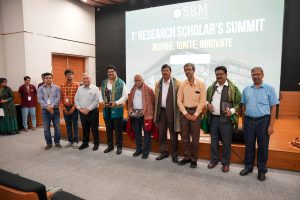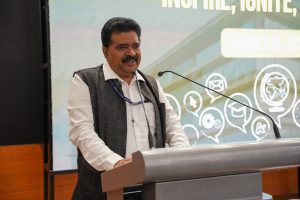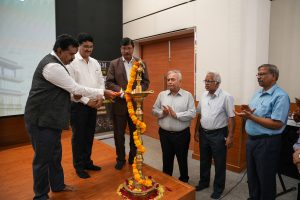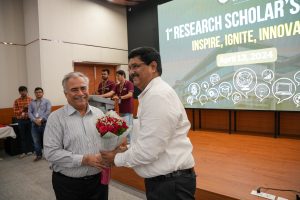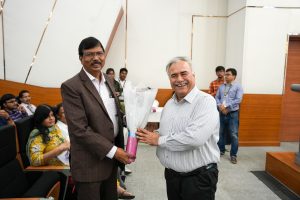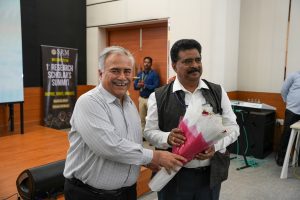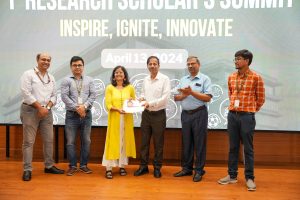Research News
- Advancing Knowledge: Publication of Groundbreaking Research Paper April 26, 2024
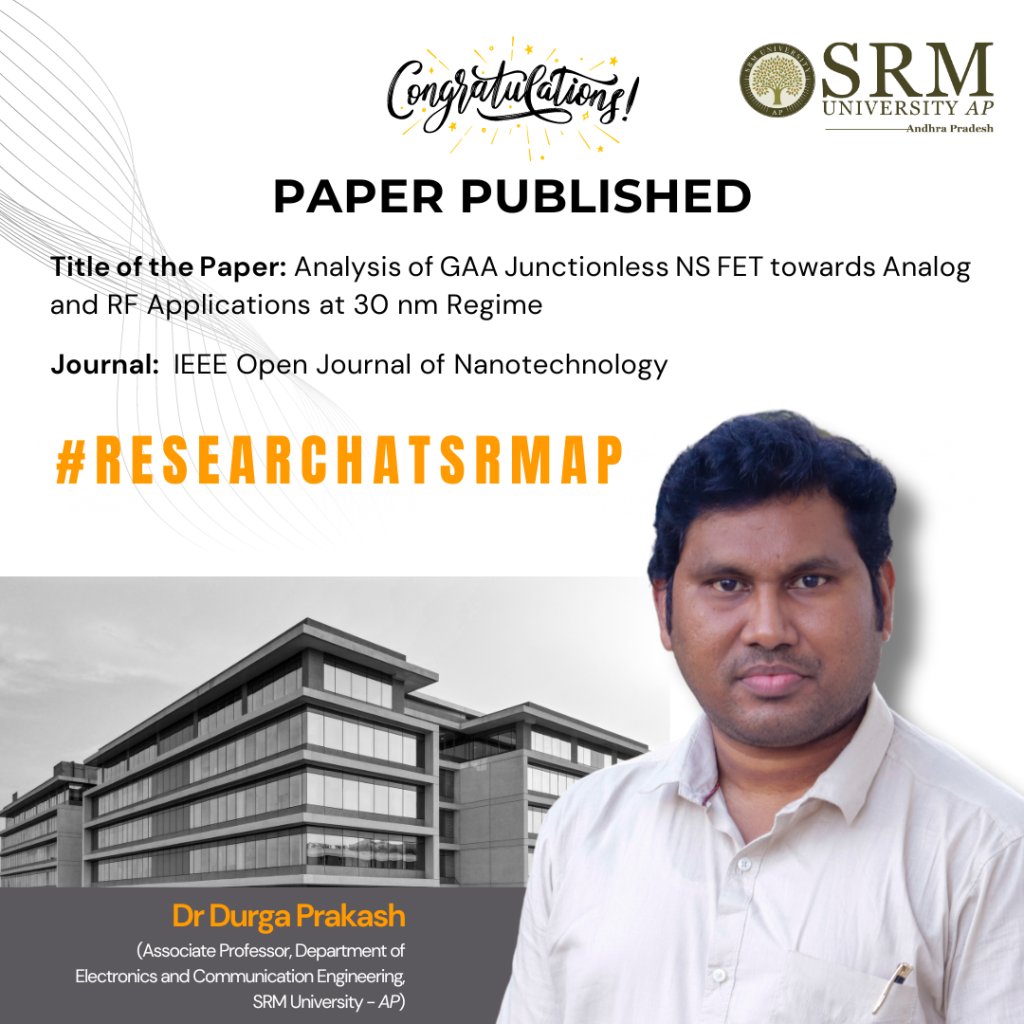
It is a matter of immense pleasure for the Department of Electronics and Communication Engineering to announce the publication of Dr Duga Prakash, Associate Professor at SRM University-AP. His research paper titled “Analysis of GAA Junctionless NS FET towards Analog and RF Applications at 30 nm Regime”, published in IEEE Open Journal of Nanotechnology, studies how the device can be manufactured with ease and minimal doping, eliminating the need for high-temperature doping processes. The enhanced performance metrics suggest that the device’s potential for faster analog/RF switching circuits paves the way for more efficient analog and RF applications at the 30 nm scale.
Abstract:
A new nanosheet FET is used to generate a quantum model in this research. A Gate-all-around (GAA) Junction-less (JL) nanosheet device with a 1 nm gate dielectric of SiO2 and HfO2 performs according to the standard model. The visual TCAD tool examines ION, IOFF, ION/ IOFF, threshold voltage, DIBL, gain parameters (gm, gd, Av), gate capacitance, and cut-off frequency to evaluate the classical and quantum models of the GAA nanosheet device. Simulation results show that the device’s low gate capacitance of 10–18 makes it suitable for rapid switching applications. Device research reveals a transconductance (gm) value of 21 μS and a remarkable cut-off frequency of 9.03 GHz. Its P-type device response has also been extensively studied. Finally, the inverter model uses the proposed GAA nanosheet device. Despite having larger gate capacitance, the NSFET-based inverter offers the smallest propagation delay helps apply knowledge to real-world situations.
Continue reading →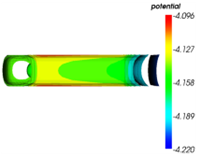
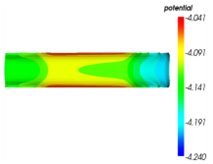
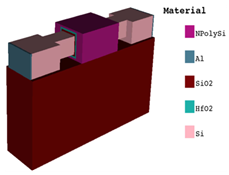
- Unveiling the Post-Pandemic Tapestry of Mind and Body in Türkiye April 24, 2024
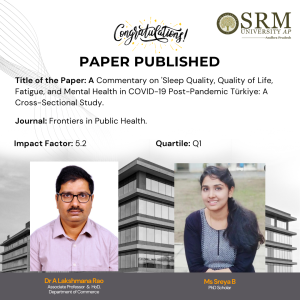 We are thrilled to announce that Dr A Lakshmana Rao, Associate Professor from the Department of Commerce along with Ms Sreya B, a distinguished PhD Scholar, have made a significant contribution to the field of public health with their latest publication.
We are thrilled to announce that Dr A Lakshmana Rao, Associate Professor from the Department of Commerce along with Ms Sreya B, a distinguished PhD Scholar, have made a significant contribution to the field of public health with their latest publication.Their paper, titled “A Commentary on ‘Sleep Quality, Quality of Life, Fatigue, and Mental Health in COVID-19 post-pandemic Türkiye: A Cross-Sectional Study’,” has been published in the esteemed journal Frontiers in Public Health, which boasts an impressive impact factor of 5.2.
This groundbreaking study delves into the crucial aspects of sleep quality, quality of life, fatigue, and mental health in the aftermath of the COVID-19 pandemic in Türkiye. The research provides insightful commentary and analysis, contributing valuable knowledge to our understanding of the pandemic’s long-term effects on human well-being.
The SRM University-AP community is proud of Dr Rao and Ms Sreya B for their dedication and excellence in research. Their work not only enhances the reputation of our institution but also serves as an inspiration for our students and faculty alike.
We congratulate them on their achievement and encourage our readers to access the full paper to learn more about the study’s findings and implications for public health.
Abstract
This commentary examines the impact of the COVID-19 pandemic on mental health and sleep quality among the Turkish population, focusing on socio-demographic disparities and gender-based differences. To investigate the lasting effects of the pandemic, a comprehensive cross-sectional, multi-center-based survey was conducted in 2022. The study used robust sampling strategies and validated assessment tools such as WHOQOL-BREF, PHQ-15, DASS-21, GAD-7, PSQI, and FAS to reveal significant associations between poor sleep quality and worsened mental health.
The findings highlight the need for targeted interventions post-pandemic. The study conducted a detailed analysis, including multivariate regression, to explore the interaction between socio-demographic factors, mental health, and sleep quality, providing valuable insights for future public health interventions that consider both socio-demographic characteristics and lifestyle factors. In conclusion, the study advocates prioritising interventions that enhance sleep quality as a crucial aspect of post-pandemic public health, offering potential avenues for mitigating mental health disorders. Despite acknowledged limitations, the research’s contributions to understanding post-pandemic mental health challenges underscore its relevance in shaping targeted public health interventions.
Explanation of the Research in Layperson’s Terms
This article discusses a research study conducted in Turkey to investigate the impact of the COVID-19 pandemic on people’s sleep, quality of life, fatigue, and mental health. The study discovered that numerous individuals experienced sleep problems and mental health disorders following the pandemic, likely due to stress and social isolation. It suggests that enhancing sleep quality could help to improve mental health in the future, emphasising the significance of addressing these issues in public health strategies.
Title of Research Paper in the Citation Format
Sreya B, Lakshmana Rao A, (2024) Commentary: Sleep quality, quality of life, fatigue, and mental health in COVID-19 post-pandemic Türkiye: a cross-sectional study. Front. Public Health 12:1393054. Doi: 10.3389/fpubh.2024.1393054
Practical Implementation or the Social Implications Associated with the Research
The findings of the research have significant practical and social implications for addressing the impact of the COVID-19 pandemic on the Turkish population. The study underscores the importance of targeted interventions aimed at improving sleep quality to mitigate long-term mental health challenges. These interventions might involve stress management programs, education on sleep hygiene, and increased access to mental health services. Furthermore, optimising healthcare resource allocation by prioritising mental health services and sleep disorder clinics could enhance support for individuals struggling with mental health issues.
Public health campaigns focusing on the importance of sleep for mental well-being could raise awareness and promote strategies for improving sleep quality across various demographic groups. Additionally, the research helps reduce stigma around mental health by highlighting the prevalence of mental health symptoms and sleep disturbances post-pandemic, encouraging more individuals to seek support without fear of judgment. Moreover, recognising the impact of social isolation on mental health and sleep quality underscores the importance of fostering social support networks and community connections to aid in post-pandemic recovery.
Policy development informed by the research findings could address broader social determinants of health, such as housing insecurity and access to healthcare, to create a more supportive environment for mental health and sleep quality improvement initiatives. Overall, integrating mental health and sleep quality considerations into post-pandemic recovery efforts is crucial for promoting the overall well-being of the Turkish population.
Continue reading → - Triumphant Trio: Dr Soumyajyoti and Scholars Make Strides in Physics April 22, 2024
 In a significant academic achievement, Dr Soumyajyoti Biswas, Assistant Professor and Scholars Ms Diksha and Mr Gunnemeda Eswar in the Department of Physics, has published an insightful paper in the prestigious Q1 journal, Physical Review E. The paper, titled “Prediction of depinning transitions in interface models using Gini and Kolkata indices,” presents a novel approach to understanding the complex phenomena of depinning transitions in physical systems.
In a significant academic achievement, Dr Soumyajyoti Biswas, Assistant Professor and Scholars Ms Diksha and Mr Gunnemeda Eswar in the Department of Physics, has published an insightful paper in the prestigious Q1 journal, Physical Review E. The paper, titled “Prediction of depinning transitions in interface models using Gini and Kolkata indices,” presents a novel approach to understanding the complex phenomena of depinning transitions in physical systems.The research introduces the use of Gini and Kolkata indices as predictive tools, offering a fresh perspective that could pave the way for new discoveries in the field. This publication not only underscores Dr. Biswas’s expertise but also enhances the university’s reputation as a hub for cutting-edge research.
The Department of Physics congratulates Dr. Biswas on this remarkable accomplishment and looks forward to the continued impact of his work on the scientific community.Abstract
The intermittent dynamics of driven interfaces through disordered media and its subsequent depinning for large enough driving force is a common feature for a myriad of diverse systems, starting from mode-I fracture, vortex lines in superconductors, and magnetic domain walls to invading fluid in a porous medium, to name a few. In this work, we outline a framework that can give a precursory signal of the imminent depinning transition by monitoring the variations in sizes or the inequality of the intermittent responses of a system that are seen prior to the depinning point. In particular, we use measures traditionally used to quantify economic inequality, i.e., the Gini index and the Kolkata index, for the case of the unequal responses of precritical systems.
The crossing point of these two indices serves as a precursor to imminent depinning. Given a scale-free size distribution of the responses, we calculate the expressions for these indices, evaluate their crossing points, and give a recipe for forecasting depinning transitions.We apply this method to the Edwards-Wilkinson, Kardar-Parisi-Zhang, and fiber bundle model interface with variable interaction strengths and quenched disorder. The results are applicable for any interface dynamics undergoing a depinning transition.
Explanation of Research in Layperson’s Terms
Many different physical systems, from cracking in materials to the movement of magnetic fields, share a common underlying behavior – they all involve an “interface” or boundary that moves through a disordered, or irregular, medium. As this interface moves, it often gets “pinned” or stuck in place by the disorder in the medium. However, as the driving force on the interface increases, there comes a point where the interface suddenly “depins” and starts moving much more freely. This transition from a pinned to a depinned state is called the “depinning transition” and it’s an important phenomenon in many areas of science and engineering.
In this work we have found a way to detect when this depinning transition is about to happen, before it actually occurs. We do this by looking at the sizes or magnitudes of the intermittent, or irregular, responses of the system as the driving force increases. Specifically, we use two measures that are traditionally used to quantify economic inequality – the Gini index and the Kolkata index. These give a way to track how “unequal” or unevenly distributed the sizes of the responses are. We found that when these two inequality measures cross each other, it serves as a precursor or early warning sign that the depinning transition is imminent. This is a powerful result because being able to predict when depinning will happen is very useful in fields like material science, superconductivity, and fluid dynamics, where controlling these phase transitions is important. By monitoring these inequality measures, one can may be able to forecast depinning events before they occur, which could lead to better design and control of these systems.
Title of Research paper in the Citation Format
Diksha, G. Eswar, and S. Biswas, Prediction of depinning transitions in interface models using Gini and Kolkata indices, Physical Review E 109, 044113 (2024).
DOI: https://doi.org/10.1103/PhysRevE.109.044113Practical Implementation or the Social Implications Associated with it
Prediction of imminent transition has implications in a wide range of disciplines, including stability of mechanical structures (buildings, aircraft, bridges, etc.), extraction of oil (fracking) to the largest scale of mechanical failure i.e., earthquakes.
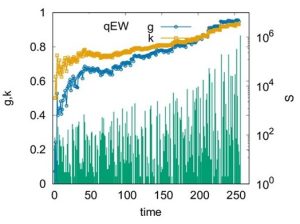
In this fig. the time series of avalanche sizes is shown along with the time variations of g and k for the quenched Edwards-Wilkinson model as a prototype. Here the crossing of g and k occurs prior to the depinning transition point (the last avalanche in the series). Therefore, the crossing of g and k can serve as a good indicator of an imminent depinning transition.
Collaborations
This work is done with the PhD student Ms Diksha and the BSc student Mr Gunnemeda Eswar.
Future Research Plans
Future research plans include applications of the methods developed here to be applied to real-life physical structures for their stability analysis and predictions of impending catastrophes.
Continue reading → - Groundbreaking Mathematical Model Sheds Light on Bone Remodeling April 18, 2024
 In a significant academic achievement, the Department of Mathematics is proud to announce that Dr Koyel Chakravarty, an Assistant Professor, along with her diligent PhD Scholar, Ms Amrutha Sreekumar, has made a remarkable contribution to the field of biological mathematics. Their paper, titled “Exploring the Impact of PTH Therapy on Bone Remodeling: A Mathematical Investigation,” has been officially accepted for publication in the prestigious Journal of Biological Systems by World Scientific.
In a significant academic achievement, the Department of Mathematics is proud to announce that Dr Koyel Chakravarty, an Assistant Professor, along with her diligent PhD Scholar, Ms Amrutha Sreekumar, has made a remarkable contribution to the field of biological mathematics. Their paper, titled “Exploring the Impact of PTH Therapy on Bone Remodeling: A Mathematical Investigation,” has been officially accepted for publication in the prestigious Journal of Biological Systems by World Scientific.This paper presents a comprehensive mathematical model that investigates the effects of Parathyroid Hormone (PTH) therapy on bone remodelling processes. The research provides valuable insights that could potentially lead to more effective treatments for bone-related diseases and conditions.
The university community extends its heartfelt congratulations to Dr Chakravarty and Ms Sreekumar for their dedication and hard work.
Abstract
The regulatory role of parathyroid hormone (PTH) on bone, a crucial calcium reservoir, is influenced by sex steroids, notably estrogen. A mathematical model elucidates PTH-mediated bone remodeling mechanisms, examining plasma PTH effects and external dosages. Daily PTH injections, with their dual anabolic or catabolic action, offer a notable treatment for severe osteoporosis. This study predicts osteogenic responses to PTH, integrating factors like TGF-β, RANKL, and bisphosphonates in osteoblast-osteoclast signaling, alongside PTH’s effects on glands and regulatory molecules like Runx2, pCREB, and Bcl2. Using various methods, including simulations and sensitivity analysis, it aims to understand PTH therapy’s impact on bone volume, enhancing its clinical relevance.
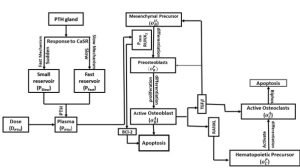
Explanation of the Research in Layperson’s Terms
The role of parathyroid hormone (PTH) in calcium storage within bones is significant, with its regulation influenced by other hormones, notably estrogen. A mathematical model has been developed to comprehend the effects of PTH on bones, examining both endogenous levels in the blood and exogenous intake requirements. It has been observed that daily PTH injections can be beneficial in treating severe bone conditions like osteoporosis, as these injections can induce either bone formation or resorption, depending on their administration method. Additionally, the response of bones to PTH is under scrutiny in this study, considering various substances such as TGF-β, RANKL, and bisphosphonates, and their interplay in maintaining bone health. Through the utilization of different methodologies including computer simulations, efforts are being made to precisely understand how PTH injections influence bone health, thereby enhancing their efficacy in addressing bone-related ailments.
Title of the Research paper in the Citation Format
Exploring the Impact of PTH Therapy on Bone Remodeling: A Mathematical Investigation
Practical Implementation or the Social Implications Associated
Personalized Treatment Plans:
Mathematical modeling of bone remodeling can facilitate the development of personalized treatment plans for individuals with bone disorders such as osteoporosis. By considering factors like hormone levels, genetic predispositions, and lifestyle factors, healthcare providers can tailor treatment strategies to optimize bone health outcomes.
1. Drug Development:
Insights gained from mathematical models can aid in the development of new drugs for bone disorders. By simulating the effects of potential therapeutic agents on bone remodeling processes, researchers can identify promising candidates for further investigation, potentially accelerating the drug discovery process.
2. Improved Clinical Decision Making:
Healthcare professionals can use mathematical models to make more informed clinical decisions regarding the management of bone disorders. By integrating patient-specific data into predictive models, clinicians can better predict treatment outcomes and adjust therapeutic interventions accordingly.
3. Enhanced Surgical Planning:
Mathematical modeling can also be valuable in surgical planning for procedures such as bone grafting or joint replacement. By simulating the effects of surgical interventions on bone remodeling, surgeons can optimize surgical techniques to promote more effective healing and long-term outcomes for patients.
4. Public Health Interventions:
Understanding the factors influencing bone remodeling at a population level can inform public health interventions aimed at reducing the burden of bone disorders. By identifying modifiable risk factors and developing targeted prevention strategies, policymakers can promote bone health and reduce the incidence of conditions like osteoporosis on a larger scale.
5. Educational Tools:
Mathematical models of bone remodeling can serve as educational tools for healthcare professionals, students, and patients. By visualizing complex biological processes in a simplified manner, these models can enhance understanding of bone physiology and the mechanisms underlying bone disorders, ultimately improving patient care and outcomes.Collaborators:
• Prof. D.C. Dalal, Professor, Department of Mathematics, IIT Guwahati
• Dr. L.N. Guin, Associate Professor, Department of Mathematics, Visva-BharatiFuture research plans.
a) Incorporating Multi-Scale Modeling: Future research could focus on integrating multi-scale modeling approaches to capture the intricate interactions occurring at different levels of bone structure, from the molecular to the tissue level. By incorporating information on cellular processes, tissue mechanics, and systemic factors, these models could provide a more comprehensive understanding of bone remodeling dynamics.
b) Accounting for Heterogeneity: There is a need to develop mathematical models that account for the heterogeneity observed in bone remodeling processes across individuals and within different anatomical sites. By considering factors such as age, sex, genetics, and bone quality, researchers can create more personalized and accurate models to predict individual responses to treatment and disease progression.
c) Integration of Advanced Imaging Techniques: Advances in imaging technologies such as micro-computed tomography (micro-CT) and magnetic resonance imaging (MRI) provide detailed insights into bone structure and function. Future research could focus on integrating data from these advanced imaging techniques into mathematical models to enhance their predictive capabilities and enable non-invasive monitoring of bone remodeling in clinical settings.
d) Exploring Therapeutic Interventions: Researchers could use mathematical modeling to explore the efficacy of novel therapeutic interventions for bone disorders, such as drug treatments, exercise regimens, and dietary interventions. By simulating the effects of these interventions on bone remodeling processes, researchers can identify optimal treatment strategies and accelerate the development of new therapies.Link to the article
DOI: https://doi.org/10.1142/S021833902450027X
Continue reading → - Research Paper on Computing In-memory Reconfigurable Adder Design April 16, 2024
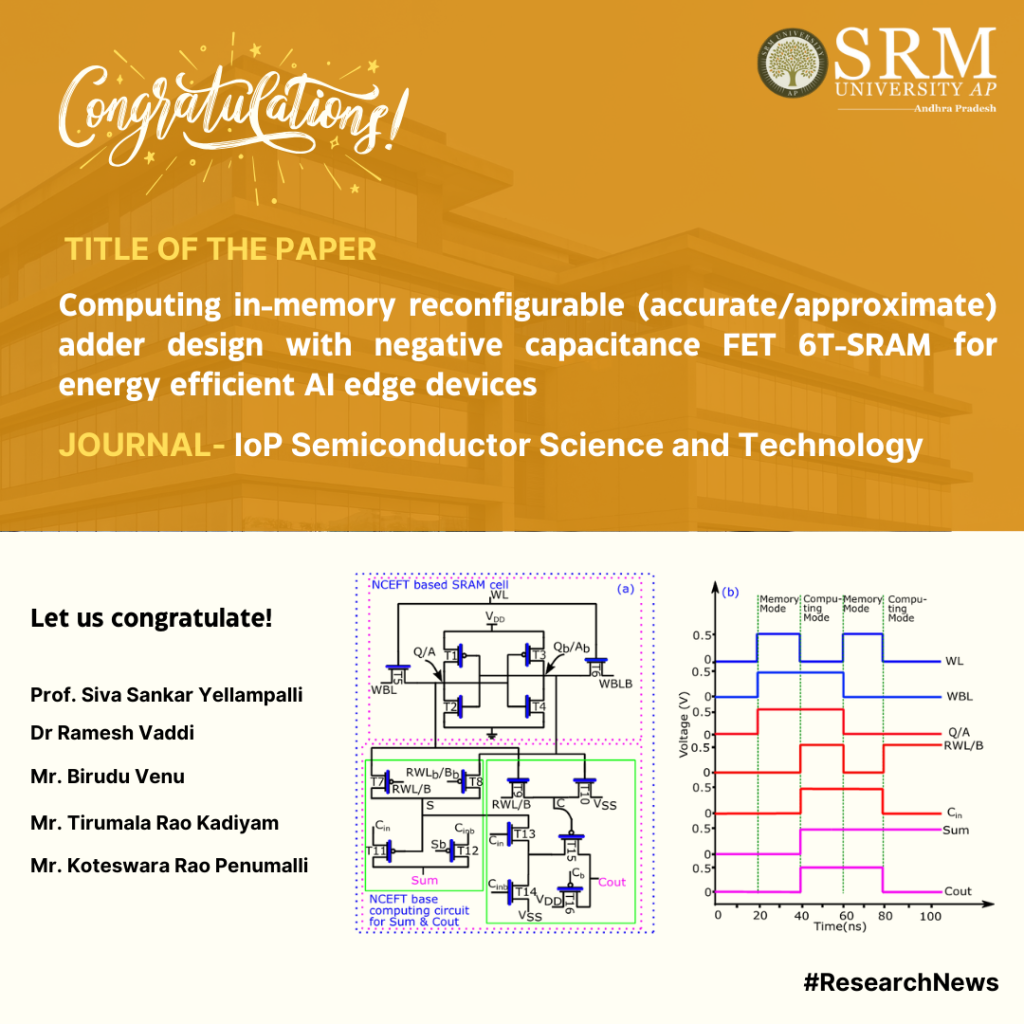
Prof. Siva Sankar Yelampalli and Dr Ramesh Vaddi, Associate Professor, from the Department of Electronics and Communication Engineering, along with research scholars Mr Birudu Venu, Mr Tirumala Rao Kadiyam, and Mr Koteswara Rao Penumalli, have jointly published a paper titled “Computing in-memory reconfigurable (accurate/approximate) adder design with negative capacitance FET 6T-SRAM for energy efficient AI edge devices” The paper introduces Computing in-memory (CiM) as a promising alternative to traditional von-Neumann architectures, focusing on its potential for energy-efficient AI edge computing with CMOS scaling. Additionally, they have explored the advancements in approximate computing in-memory (ACiM) techniques, aiming to further enhance the energy efficiency of these innovative architectures.
Abstract:
Computing in-memory (CiM) is an alternative to von Neumann architectures for energy-efficient AI edge computing architectures with CMOS scaling. Approximate computing in-memory (ACiM) techniques have also been recently proposed to further increase the energy efficiency of such architectures. In the first part of the work, a negative capacitance FET (NCFET) based 6T-SRAM CiM accurate full adder has been proposed, designed and performance benchmarked with equivalent baseline 40 nm CMOS design. Due to the steep slope characteristics of NCFET, at an increased ferroelectric layer thickness, Tfe of 3 nm, the energy consumption of the proposed accurate NCFET-based CiM design is ∼82.48% lower in comparison to the conventional/Non CiM full adder design and ∼85.27% lower energy consumption in comparison to the equivalent baseline CMOS CiM accurate full adder design at VDD = 0.5 V. This work further proposes a reconfigurable computing in-memory NCFET 6T-SRAM full adder design (the design which can operate both in accurate and approximate modes of operation). NCFET 6T-SRAM reconfigurable full adder design in accurate mode has ∼4.19x lower energy consumption and ∼4.47x lower energy consumption in approximation mode when compared to the baseline 40 nm CMOS design at VDD = 0.5 V, making NCFET-based approximate CiM adder designs preferable for energy efficient AI edge CiM based computing architectures for DNN processing.
Future research plans: Implementing reconfigurable computing in-memory (CiM) MAC for energy-efficient AI edge devices.
Continue reading →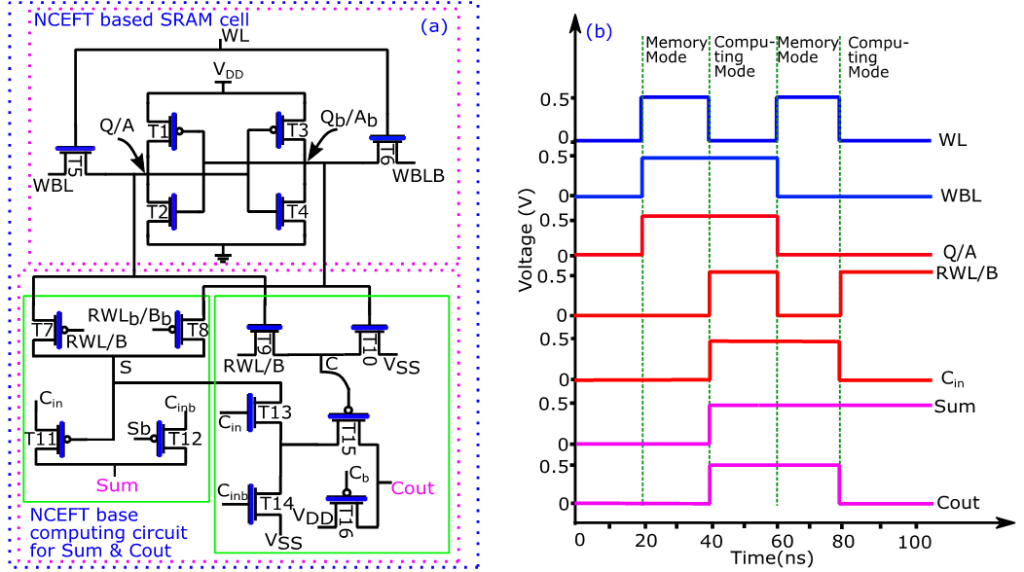
- Examining the Impact of Bifurcation on Agricultural Development in Jharkhand: A Comprehensive Study April 16, 2024
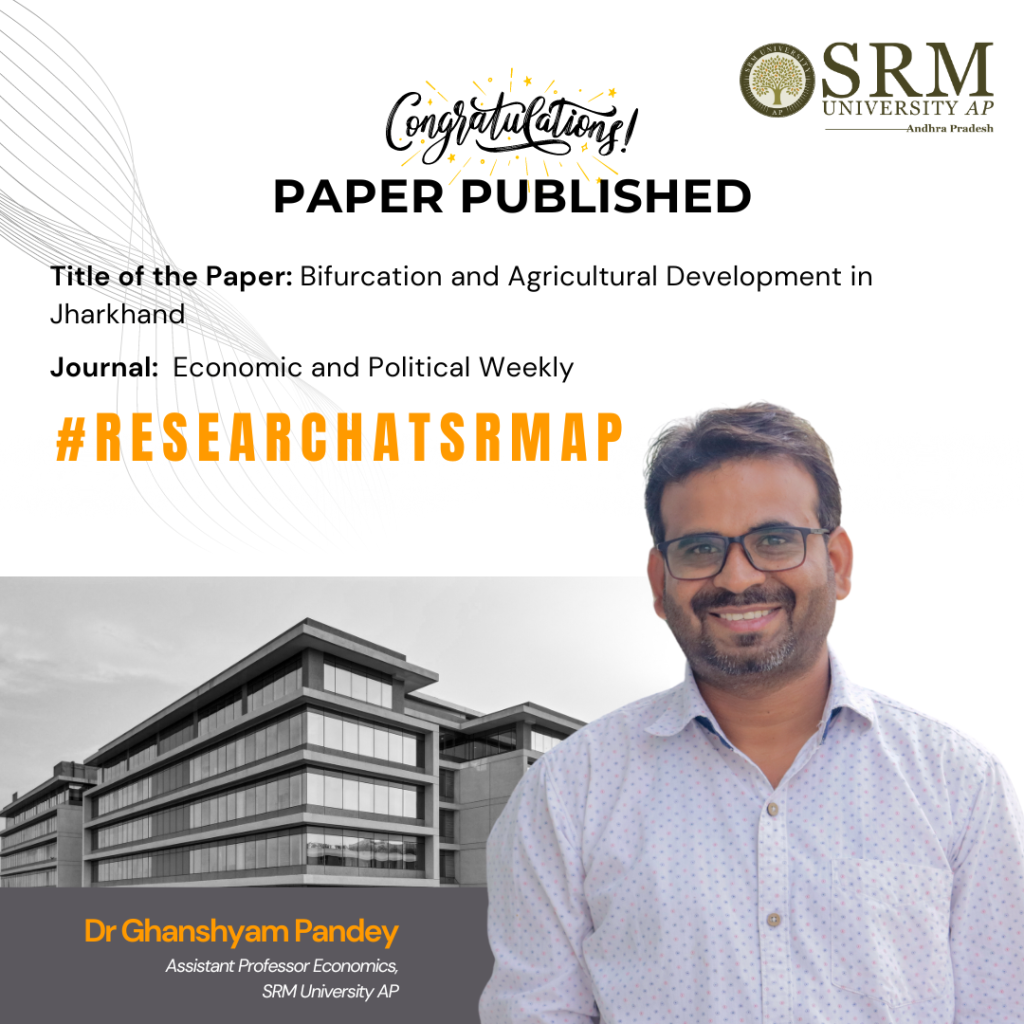
The Department of Economics is thrilled to announce the publication of Assistant Professor Dr Ghanshyam Kumar Pandey’s research paper titled, “Bifurcation and Agricultural Development in Jharkhand,” in Economic and Political Weekly. The paper delves into the developmental trajectory of Jharkhand following its bifurcation from Bihar in 2000 and examines the intricacies of agricultural development and the key determinants that have shaped its evolution post-separation.
Abstract:
The cropping pattern in Jharkhand has significantly changed from 2000 to 2016, with shifts from the cultivation of cereals to non-cereals. An increase in the crop area and diversification towards high-value crops have accelerated overall agricultural growth. Capital formation and better infrastructure facilities, along with improved fertiliser consumption and irrigation, will foster agricultural development in Jharkhand
Practical implementation:
This study shows the development path of Jharkhand after bifurcation from Bihar in 2000. The study deals with the process of agricultural development and determinants of agricultural development after its bifurcation.
Continue reading →
- Revolutionising Cooling Technology: Patent Granted for Innovative Fabric Design April 15, 2024
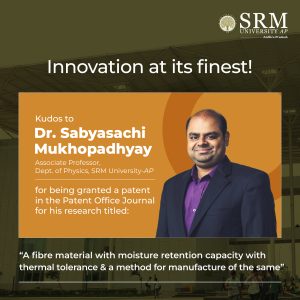 The Department of Physics is thrilled to announce a remarkable milestone in sustainable technology. Dr Sabyasachi Mukhopadhyay, Associate Professor and Ms Sreelekha Bhuvaneswari, BSc student has been officially granted a patent for their groundbreaking invention: “A fibre material with moisture retention capacity with thermal tolerance and a method for manufacture of the same.”
The Department of Physics is thrilled to announce a remarkable milestone in sustainable technology. Dr Sabyasachi Mukhopadhyay, Associate Professor and Ms Sreelekha Bhuvaneswari, BSc student has been officially granted a patent for their groundbreaking invention: “A fibre material with moisture retention capacity with thermal tolerance and a method for manufacture of the same.”This pioneering material, distinguished by its Application Number 202141023375, stands at the forefront of cooling technology. It promises to enhance thermal regulation while prioritising environmental sustainability.
Dr Mukhopadhyay’s invention is poised to make significant contributions to the field of material science, offering a versatile solution that holds potential applications across various industries. The department extends its heartfelt congratulations to the duo on this significant achievement and looks forward to the positive impact his work will continue to have on our community and beyond.
Abstract:
The project, with the patent application number 202141023375, develops a methodology to design a fabric cloth that would replace the use of air conditioners. This cloth design is inspired by Saharan silver ants which regulate their body temperatures in the scorching desert heat and also from the cooling properties of clay. This research would significantly scale down the usage of AC and other cooling devices in warm places, thus reducing the use of electricity and emission of greenhouse gases to the environment. As this cloth would be environment friendly with long durability and cost-efficiency, Sreelekha hopes that this research would bridge the socioeconomic divide of haves and have-nots between communities.
Explanation of the Research in Layperson’s Terms :
Using room conditioning AC during these times, especially with lower temperatures is very risky. Virus spread with closed circulated air or prolonged cold temperatures while breathing, so thus using air conditioning is bad. With this in mind, we need an efficient way of cooling in the snoring temperatures. We propose developing a fabric that integrates clay (Its primary mineral is kaolinite; clay may be generally described as 40% aluminium oxide, 46% silicon oxide, and 14% water.) in its synthesis; clay is known for its cooling properties given enough water to retail and proper reflection techniques for heat throughout the fabric inspired from uniquely shaped hairs with triangular cross-sections as in arrangement employed by the Saharan silver ants. This model not only conserves energy compared to room cooling but also is very practical, wherein we can dampen the fabric with the least water and retain its cooling for long hours. This Fabric could be employed in a variety of settings, for example, in making carpets and curtains in a house to keep the room temperature regulated.
Practical Implementation and Social Implications:
The research would significantly scale down the usage of AC and other cooling devices in warm places, thus reducing the use of electricity and emission of greenhouse gases to the environment. As this cloth would be environment friendly with long durability and cost-efficiency, Sreelekha hopes that this research would bridge the socioeconomic divide of haves and have-nots between communities.
The Title of Patent in the Citation Format
“A fibre material with moisture retention capacity with thermal tolerance and a method for manufacture of the same” with Application Number: 202141023375
Collaborations:
Prof. Seeram Ramakrishna, Professor of Materials, National University of Singapore
Future Research Plans:
The forthcoming endeavour encompasses the commercialisation of this pioneering concept to render it widely accessible and applicable on a larger scale.
Continue reading → - 1st Research Scholar’s Summit: A Symposium of Ideas and Innovation April 15, 2024
“The very idea of a platform such as this is to promote multidisciplinary collaborative research,” emphasised Prof. K Hemachandra Reddy, Chairman, Andhra Pradesh State Council of Higher Education (APSCHE), encapsulating the spirit of the 1st Research Scholar’s Summit hosted at SRM University-AP in partnership with the Government of Andhra Pradesh. The event was staged to reinforce research within academic circles and herald a new phase of learning. The summit was attended by esteemed dignitaries like Prof. Korukonda Babji, Vice Chancellor Dr Y S R University of Health Sciences; Prof. Ramesh Srikonda, Director-School of Planning and Architecture; Dr M Balakrishnan, IIT, Delhi, along with Vice Chancellor, Prof. Manoj K Arora; Registrar, Dr R Premkumar, Deans, Faculty, and Students.
In his keynote address, Vice Chancellor Prof. Arora emphasised the pivotal role of such summits in fostering a conducive environment. He stated, “We live in a world of collaborations, and a summit like this gives an opportunity to interact, establish partnerships and forge scholarly excellence”. He highlighted the varsity’s research acumen in the form of patents, technology transfers, research publications, start-ups, and incubations. He also declared that the varsity would be open to sharing its state-of-the-art research infrastructure among the broader demography in order to foster a research mindset among all.
Prof. Ranjit Thapa, Dean-Research at the university, highlighted the participation of 150 PhD scholars from diverse institutions. His speech reflected the tireless commitment to building the university’s scientific fortitude. Prof. Srikonda underscored the significance of technological advancement and innovation. He praised the summit for being a stage that will offer pragmatic solutions to societal challenges and commended its tagline – “Inspire, Ignite, Innovate,” for aligning with its core objectives.
Prof. Korukonda Babji and Prof. M Balakrishnan, pivotal figures in academia, articulated the transformative role of cutting-edge research in elevating society. They emphasised the potential of such forums in catalysing groundbreaking changes in research.
The summit showcased presentations from doctoral scholars, encompassing 60 poster presentations and 90 oral presentations, organised across 8 thematic areas. The summit concluded with a valedictory function, and tokens of appreciation were presented to the dignitaries by the Vice Chancellor, Registrar, Deans, and convenors, Dr Ramanjaneya Reddy and Dr Sabyasachi Chakrabortty, and members of the organising committee.
Continue reading → - Revolutionising Energy Harvesting: Dr Banee Banadana Receives Patent for Innovative System April 15, 2024
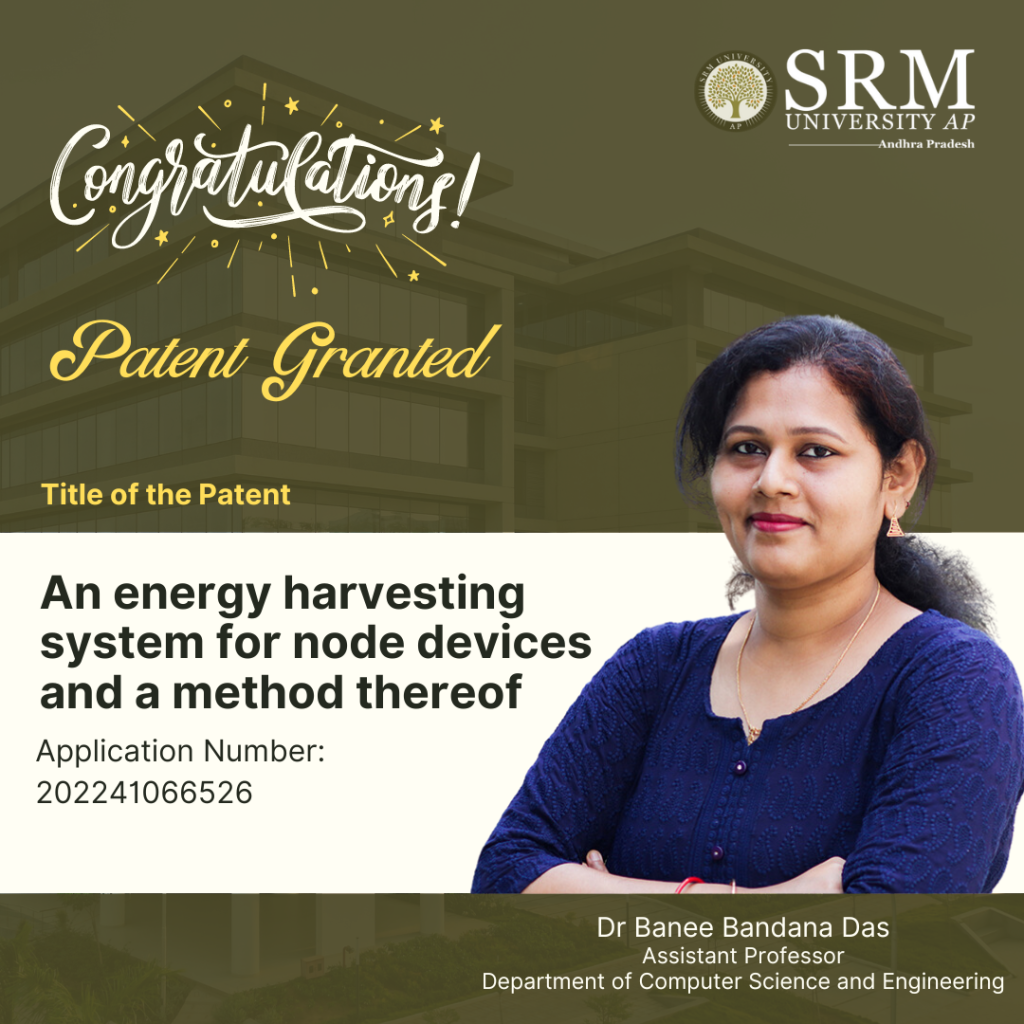
Dr Banee Bandana Das, Assistant Professor in the Department of Computer Science and Engineering, has achieved a remarkable milestone. The invention titled “An Energy Harvesting System for Node Devices and a Method Thereof” has been granted a patent by the Patent Office Journal, under Application Number: 202241066526. This achievement marks a significant leap forward in the realm of energy harvesting systems, promising a brighter and more secure future for IoT applications.
Abstract
The present invention is broadly related to design of secure and Trojan Resilient energy harvesting system (EHS) for IoT end node devices. The objective is to develop a state-of-the-art energy harvesting system which can supply uninterrupted power to the sensors used in IoT. The EHS is self-sustainable. The higher bias voltages are generated on chip. The system is mainly consisting of security module, power conditioning module, Trojan Resilient module, and load controller module. The power failure of the sensors used in IoT may leads to information loss thereby causing catastrophic situations. An uninterrupted power supply is a must for smooth functioning of the devices in IoT. This invention caters secure power requirements with security issues of IoT end node devices.
Practical Implementation:
The IoT end node devices needs 24*7 power supply and are very sensitive to attacks made by adversaries before and after fabrication. This invention takes care of the power requirement of end node devices with green energy and secure the EHS-IC from adversaries and attacks and therefore can be used by individuals, as powering sensors at remote locations and as part of smart agriculture.
Future research plans:
Design more secure and reliable design for making a IoT smart node smarter and self-Sustainable. Exploring more circuit level techniques and find new way to design more power efficient designs.
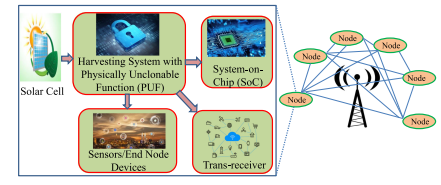
Continue reading → - April 15, 2024
Dr Banee Bandana Das, Assistant Professor in the Department of Computer Science and Engineering, has achieved a remarkable milestone. The invention titled “An Energy Harvesting System for Node Devices and a Method Thereof” has been granted a patent by the Patent Office Journal, under Application Number: 202241066526. This achievement marks a significant leap forward in the realm of energy harvesting systems, promising a brighter and more secure future for IoT applications.
Abstract
The present invention is broadly related to design of secure and Trojan Resilient energy harvesting system (EHS) for IoT end node devices. The objective is to develop a state-of-the-art energy harvesting system which can supply uninterrupted power to the sensors used in IoT. The EHS is self-sustainable. The higher bias voltages are generated on chip. The system is mainly consisting of security module, power conditioning module, Trojan Resilient module, and load controller module. The power failure of the sensors used in IoT may leads to information loss thereby causing catastrophic situations. An uninterrupted power supply is a must for smooth functioning of the devices in IoT. This invention caters secure power requirements with security issues of IoT end node devices.
Practical Implementation:
The IoT end node devices needs 24*7 power supply and are very sensitive to attacks made by adversaries before and after fabrication. This invention takes care of the power requirement of end node devices with green energy and secure the EHS-IC from adversaries and attacks and therefore can be used by individuals, as powering sensors at remote locations and as part of smart agriculture.
Future research plans:
Design more secure and reliable design for making an IoT smart node smarter and self-Sustainable. Exploring more circuit level techniques and find new way to design more power efficient designs.
Continue reading →


